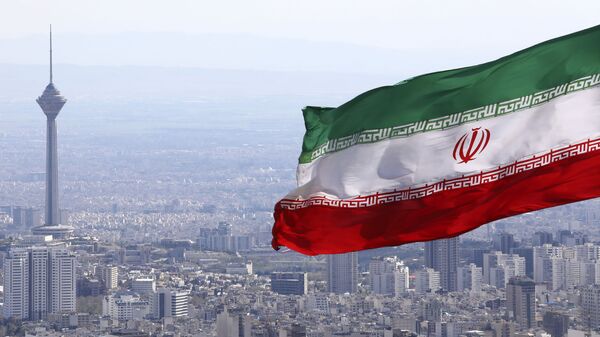US Secretary of State Mike Pompeo has started a thread of messages on Twitter devoted to the Trump administration's efforts directed against Iran, boasting about the country's alleged successes in the field.
The top diplomat started with the bizarre claim that there could hardly be a more difficult task than normalising relations with the Islamic Republic. What is stranger is that Pompeo substantiated his allegation with a claim that the Iranian regime is a "group of radical ideologues" who have been chanting "Death to America" since 1979.
The Trump Administration recognizes the Iranian regime is a group of radical ideologues who have been chanting “Death to America” since 1979. pic.twitter.com/NTKLMHSBI3
— Secretary Pompeo (@SecPompeo) January 12, 2021
While the phrase is popular in the Islamic Republic, it can hardly be called a daily mantra for locals. It is usually chanted after the US makes a provocative move against Iran, for example, by imposing sanctions on an entire sector of its economy, or killing a top general visiting Iraq on a diplomatic mission.
Success of US Sanctions?
Pompeo went on to claim that were it not for Trump's sanctions, which were introduced in 2018 after the US ditched the 2015 Iran nuclear deal, Tehran would have purportedly developed nuclear weapons. The secretary of state claimed that US sanctions deprived Tehran of $70 billion in income, removing two million barrels of Iranian oil from the market, and depriving the country of foreign investments. The US diplomat claimed that these actions had crippled Tehran's military budget, which sank by 24% in 2020.
Thanks to our sanctions, Iran's proposed military budget is down 24% this year. We've targeted more than 1,500 individuals and entities, depriving the regime of $70 billion that would've been used to fund terrorism, ballistic missiles, and nuclear programs. #MaximumPressureWorks pic.twitter.com/opwwFNzDMg
— Secretary Pompeo (@SecPompeo) January 12, 2021
The secretary of state ignored the fact that the country, like many other states, diverted significant resources to fight off the coronavirus pandemic in the past turbulent year, which forced even the Pentagon to tighten its belt for some of its projects. Pompeo also ignored repeated statements made by Tehran that not only does it not seek to create nuclear weapons, but it also considers them incompatible with the country's religion, Islam. The republic has long agreed to allow the IAEA to monitor its nuclear facilities to ensure the peaceful nature of its nuclear programme and limited its development in exchange for lifting international sanctions.
Better Than War
At the end of the thread, Pompeo suggested that the foreign policy towards Iran under President Trump had allowed Washington to "deter Iran and secure America". The top diplomat went on to allege that this approach had saved the US from the need to send "thousands" of American soldiers to the Middle East.
Thousands of American sons and daughters in uniform to the Middle East? No. Punish evil, deter Iran, and secure America. Yes. pic.twitter.com/x42xTkPihf
— Secretary Pompeo (@SecPompeo) January 12, 2021
The secretary of state alleged that Iran posed a clear threat to the US and its ally, Israel, on a daily basis. In that regard, he went on to praise the move of the administration to put Iran's main military forces, the Islamic Revolutionary Guard Corps, on the list of Foreign Terrorist Organisations in 2019. Pompeo insisted that, in his opinion, it was a fitting label for the IRGC, without elaborating further.
Let’s talk Iran. The men in these photos threaten America and Israel nearly every day. pic.twitter.com/CROlrItsHk
— Secretary Pompeo (@SecPompeo) January 12, 2021
When Trump assumed office in 2017, the US policy towards Iran changed drastically. After a diplomatic breakthrough in 2015 that reintegrated Iran into the global economy and assured the peaceful nature of its nuclear programme, Washington walked away from its obligations, opting for a so-called "maximum pressure" policy. The White House demanded that Tehran abandon its nuclear programme for good and change its purportedly destabilising behaviour in the region.
As a direct result of the US actions, Iran stopped complying with the nuclear deal's provisions, arguing that it was no longer benefitting from adhering to them. The country lifted limits on its nuclear fuel stockpiles and recently ramped up its allowed enrichment capacity to 20% and enabled the use of advanced centrifuges. Although it is still a far cry from creating material suitable for creating a nuclear weapon, the increase in enrichment has raised concerns around the globe.
At the same time, incoming US President Joe Biden has promised to try to restore the Iran nuclear deal and engage in negotiations with Tehran. It is currently unclear whether a new deal between the two countries will repeat the original 2015 accord, or whether Washington will demand more from Iran.





